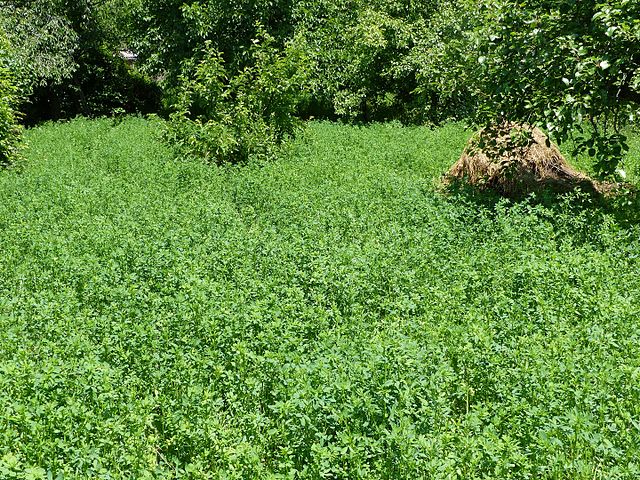Alfalfa, which is a perennial herb, has a long list of dietary and medicinal uses and research has proven that Alfalfa might lower blood levels of cholesterol and glucose. Many take Alfalfa supplements orally and is has been proven safe except in a small percentage of people where it produces lupus like symptoms. In the seeds and sprouts of Alfalfa, amino acid L-canavanine is present and that is what is thought to cause this reaction. However, this is not present in the leaves of the Alfalfa. The whole leaf and the herb are what are rendered from the Alfalfa plant.
Since the sixth century the Chinese have used Alfalfa to relieve fluid retention and swelling. The Arabs were the first to find Alfalfa and they named it “the father of all foods.” The leaves of the Alfalfa plant are very rich in minerals and nutrients, including potassium, calcium, magnesium, and carotene. The Arabs first fed it to their horses because they believed the Alfalfa made them swift and mighty. Alfalfa has been an animal crop for over a thousand years but is also used as an herbal medicine.
Alfalfa is a good diuretic and also a good laxative. It also works well for urinary tract infections, and kidney, bladder and prostrate disorders. The latest and greatest discovery of Alfalfa is the benefits that it might provide for lowering cholesterol because there are certain agents in Alfalfa that stick to cholesterol which keeps it from remaining in the blood stream. Further, it may also have a very strong relationship with lowering blood sugar levels.
When it comes to Alfalfa it is something that many people enjoy in their cuisine. It is good in salads and some people eat it as a vegetable all alone. Many people claim that eating Alfalfa is a big part of eating healthy. Besides wheat grass and algae, Alfalfa has the most nutritional value. It is high in fiber, vitamins, minerals, and has all of the required digestive enzymes.
It is warned by avid Alfalfa lovers that you likely will not like the way that it tastes in your mouth, it may feel like it is burning the tip of your tongue and you actually might just completely dislike it however, they urge you to not give up because it is an acquired taste and you will begin to like it. The best news is that soon after eating it regularly you will find that your appetite for heavier foods will diminish.
Alfalfa is also great for reducing fevers and is very good for the blood. It contains natural fluoride and prevents tooth decay. Alfalfa makes a great tea because when the Alfalfa leaves steep in the hot water it is a source of nitrogen. The tea is not only made for human consumption because people who grow Irises and Delphiniums just love Alfalfa tea because of the great effect that it has on the plants when used as a foliar spray. Many with a green thumb also use Alfalfa as mulch for their flower beds.
Discover more from LandmarkLocation.com
Subscribe to get the latest posts sent to your email.


